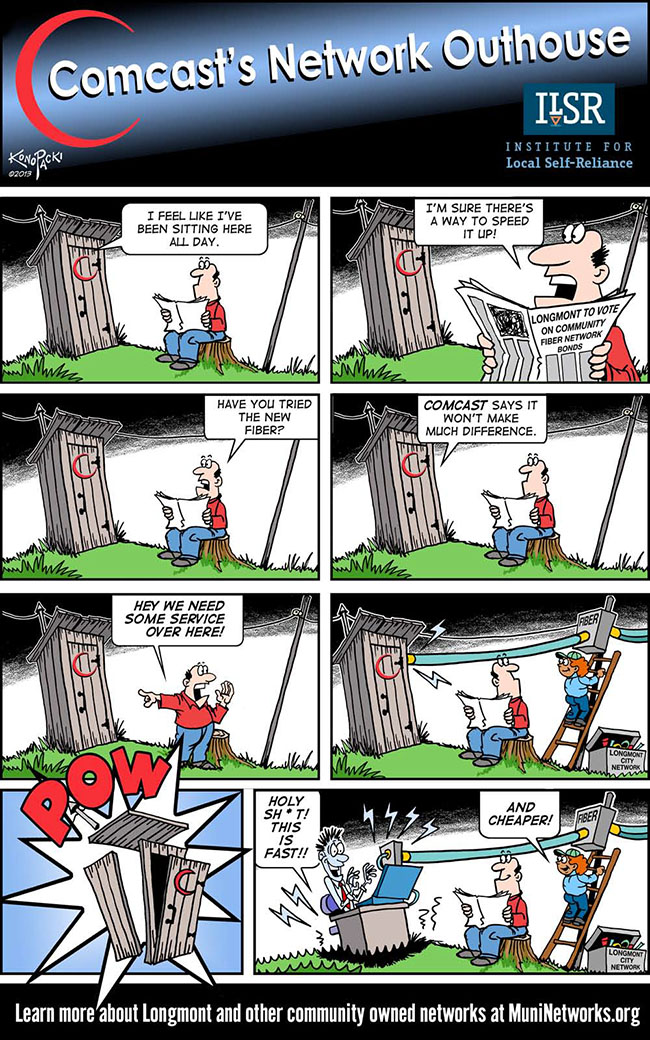
Fast, affordable Internet access for all.

Fiber to the Home

 Download this comic as a pdf. Sign up for our one-email-per-week newsletter with ongoing coverage of community owned networks.
The local newspaper notes that some local businesses have already signed on, including a clinic:
Download this comic as a pdf. Sign up for our one-email-per-week newsletter with ongoing coverage of community owned networks.
The local newspaper notes that some local businesses have already signed on, including a clinic:
Jurey said the city's network is three times faster than the speeds the clinic got before at a cost savings of $1,600 a month.On November 5, citizens will decide a referendum on whether to expedite the building by issuing revenue bonds without increasing local taxes. A brochure explaining pro and con is available here [pdf]. Approving the bonds means building the network to everyone in a few years while not approving it will mean building the network over several decades. We recently did a podcast with Longmont Power and Communications Broadband Services Manager Vince Jordan and a local citizen campaigning for the referendum. Listen to that show here. Read the rest of our coverage about Longmont here.
The East Central Vermont Community Fiber Network (ECFiber) continues to grow, tripling in size in just the past year. We reported last summer that the community owned network had raised the funding for an expansion. Fundraising and reach surpassed the original expansion plan and the network now boasts 180 miles.
The Valley News recently reported that:
Next year, ECFiber plans to focus on connecting customers in unserved parts of Royalton, Strafford, Norwich, Tunbridge and Sharon.
ECFiber is seeking additional investment during this quarter to finance the work next year, and has set a goal of having more than 1,000 customers connected by the end of 2014.
ECFiber seeks funding by selling tax-exempt promissory notes to local investors. There are 23 member towns in the ECFiber consortium, including Montpelier. For detailed maps of service area and planned expansions, check out the ECFiber's Where Are We Working page.
The article goes on to note that Tim Nulty is planning to retire from his position as CEO of ValleyNet, the nonprofit behind ECFiber. Nulty will take on the role of board Chairman. Leslie Nulty will also shift from project coordinator and will continue as a ValleyNet board member.
Leslie visited with Chris in the Broadband Bits podcast episode #9. She shared ECFiber's history and the two discussed the community owned network model that is ECFiber.
We have followed happenings in Opelika, Alabama, for three years as the community investigated the benefits of a fiber network. They contended with a Charter misinformation campaign and voted yes on a referendum. Construction began in 2012, Opelika Power Services (OPS) tested the network, and recently the Opelika City Council approved proposed rates.
OANow.com now reports that the FTTH network and smart grid project is ever-so-close to offering triple play services to the city's 28,000 residents and local businesses.
OPS offers three standard bundled plans, but customers can also customize. All three include voice:
Data offerings for customized plans range from 10/5 Mbps for $34.95 to 1 Gbps symmetrical for $499.95.
Another great video from Australia makes many salient points regarding the debate over their national broadband network. One key point to take away is that it is possible to talk to non-technical normal people about this subject without overwhelming them or boring them.
Another is that FTTN = fiber to the nowhere, not fiber to the node.
When it comes to building infrastructure, we should make smart long term investments. That said, we are strongly supportive of locally owned, fiber networks. Local ownership trumps national ownership because proximity lends itself to accountability.

DePriest tells me that EPB's fiber network is "a great profit center." In the four years the service has been active, the utility company has increased its mid-tier speeds three times — from 15 Mbps to 30 Mbps, from 30 Mbps to 50 Mbps and now from 50 Mbps to 100 Mbps. About 2,500 elite users will enjoy 1-gig speeds by the beginning of October.Phil Dampier has more coverage at StoptheCap.com, including an analysis of AT&T and Comcast competition.
AT&T charges $65 a month for 24/3Mbps service — its fastest — with a 250GB monthly usage cap, currently not enforced. For $5 more, EPB customers get 1,000/1,000Mbps with no usage limits or overlimit fees.A recent article in the Chattanoogan noted that Chattanooga had surpassed 50,000 subscribers and was on path to surpass Comcast in subscriber base locally.
Mr. DePriest said Comcast had some 122,000 customers on the EPB grid when EPB launched its rival program. He said Comcast is down to around 75,000 and will likely drop to around 60,000 next year.
